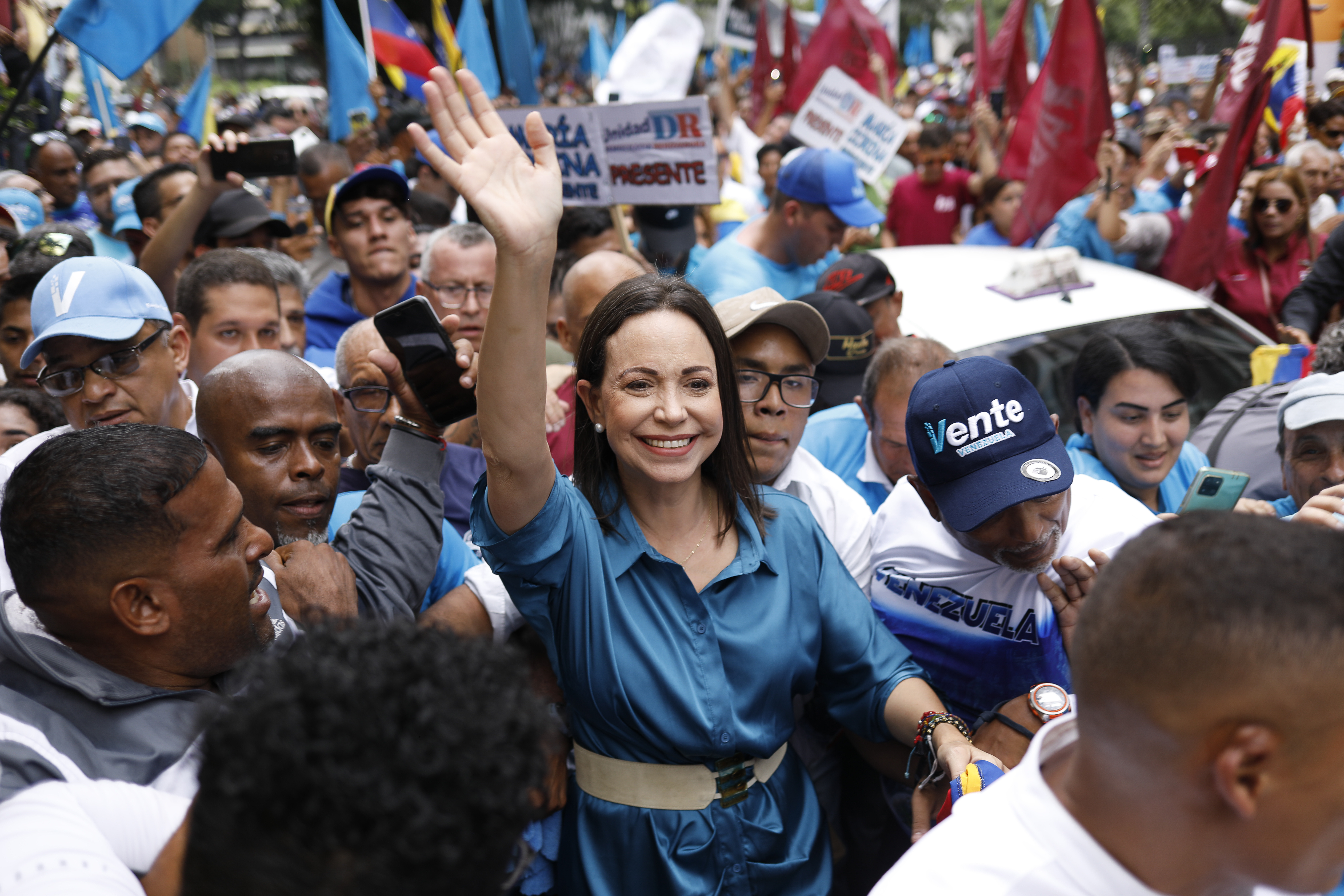Venezuela
Defining Moment: European Parliament Stands Firm for Free and Fair Elections in Venezuela

Die venezolanische Oppositionsführerin Maria Corina Machado marschiert mit ihren Anhängern, um die Registrierung ihrer Kandidatur für die Vorwahlen der Opposition am 22. Oktober vor der Nationalen Kommission für Vorwahlen auf der Plaza Altamira in Caracas, Venezuela, zu formalisieren.
© picture alliance / AA | Pedro Rances MatteyThe European Parliament has expressed deep concern over the political situation in Venezuela and the upcoming 2024 elections, emphasizing the need for a return to democracy in the country. In a recent resolution, the Parliament condemned the arbitrary disqualifications of candidates and interference by the Maduro regime in the electoral process.
The resolution highlights the institutional, economic, and political instability in Venezuela, which has forced millions of people to flee the country. It also points out the systematic restrictions on public information, freedom of opinion and expression, and the right to assembly, further undermining democratic principles.
Following the resignation of three key rectors from Venezuela's National Electoral Council (CNE) in June, the remaining two rectors were subsequently compelled to step down. The illegitimate National Assembly has taken it upon itself to appoint representatives aligned with the regime to fill the vacant positions. This development significantly undermines the impartiality and independence of the electoral process.
The resolution also refers to the politically motivated disqualifications, specifically of María Corina Machado, Leopoldo López, Henrique Capriles, and Freddy Superlano. Jordi Cañas, speaking on behalf of the Renew Group, claimed during the debate in the European Parliament:
The regime of Nicolás Maduro is a regime addicted to crime and disqualifications. In recent years, more than 1,400 citizens have been disqualified, unable to exercise their right to vote and be elected."[1]
The disqualifications directly contradict the recommendations of the EU election observation mission and severely curtail the rights of Venezuelans to select their representatives. The resolution arises in response to the regime's decision to bar María Corina Machado, the opposition frontrunner and leader of the liberal party Vente Venezuela, from holding office for a duration of 15 years. This decision, marked by irregularities and evident political motives, has been met with strong criticism and is seen as a deliberate attempt to undermine her position ahead of the upcoming primary election on October 22nd.
Dita Charanzová, Vice President at the European Parliament, stated[2]:
[...] the disqualification of María Corina Machado is a grave attack on freedom, clear evidence that Maduro has no intention of allowing a true democratic transition. Only free elections will lead to democracy and the freedom of the Venezuelan people.
The resolution strongly condemns these actions and calls for an independent nomination procedure for CNE appointments. It recognizes the efforts of the opposition to organize primary elections as a democratic solution and urges the Venezuelan authorities to create the necessary conditions for fair, free, inclusive, and transparent elections. The resolution also calls on the European Union to support a return to democracy in Venezuela and to exert pressure on the Maduro regime to release all political prisoners. It emphasizes the importance of implementing the recommendations of the EU election observation mission and fully supports the International Criminal Court investigations into the regime's crimes and acts of repression.
During the EU-Community of Latin American and Caribbean States summit, the European Parliament sees an opportunity to uphold the principles of the rule of law, democracy, and human rights. It urges all participants to issue a statement demanding full respect for human rights, democracy, and fundamental freedoms.
The European Parliament's resolution underscores the urgent need for democratic reforms and fair elections in Venezuela, highlighting the international community's commitment to supporting the Venezuelan people in their quest for a return to democracy and respect for human rights.
In the words of Charanzová:
Niome Hüneke-Brown is project manager of the Andean Countries Project Office of the Friedrich Naumann Foundation for Freedom in Lima, Peru.
[1] https://www.europarl.europa.eu/doceo/document/CRE-9-2023-07-12-INT-3-451-0000_ES.html
[2] https://www.europarl.europa.eu/doceo/document/CRE-9-2023-07-12-INT-3-455-0000_ES.html
[3] https://www.europarl.europa.eu/doceo/document/CRE-9-2023-07-12-INT-3-455-0000_ES.html
